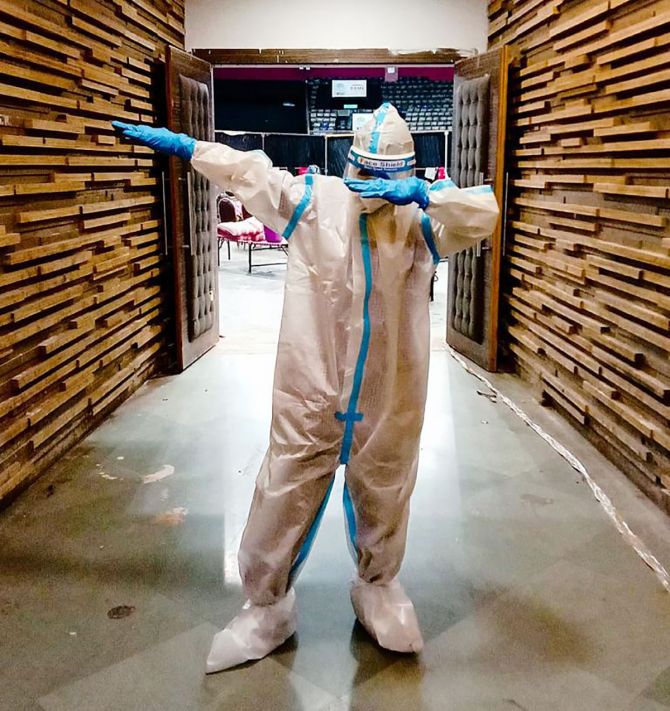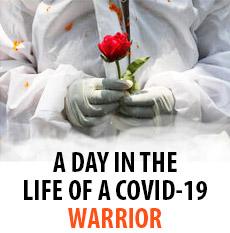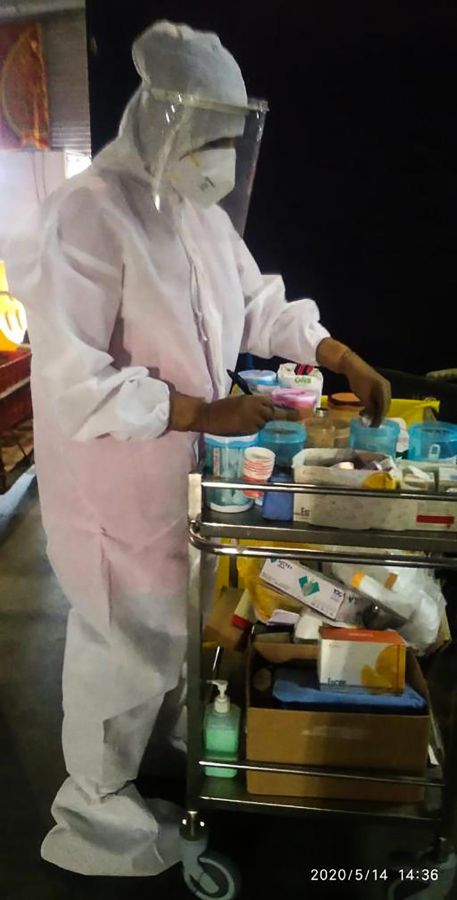'Florence Nightingale made her mark serving wounded soldiers in a war.'
'This is our time to serve in another health crisis.'

One of the lesser known soldiers in the Covid fightback are nursing students. As young as 21 and 22, these young women have been at the forefront of the battle.
Donning PPE kits for 8 to 9 hours every day, they have discharged their duties in Covid wards admirably. Brave and committed, they are yet to get their nursing degrees, but have put their heart and souls into this battle.
The first nurse, Florence Nightingale, made her mark serving wounded soldiers in the Crimean War.
"This pandemic is our time to serve and learn," says a fourth year, BSc Nursing student at Mumbai's Gambirchand College of Nursing in Matunga, north central Mumbai.
Students from the college have played stellar role at the largest Covid facility in Mumbai for the past three months.
"They are the foot soldiers of this war," says Dr Rais Ansari, one the doctors assigned to the facility at the National Sports Club of India dome in Worli, south central Mumbai.
Archana Masih/Rediff.com spoke to some of these young Covid Warriors. Their stories are a lesson in courage and service.

Prachi Lokhande, 22, Final year BSc Nursing
"Khoon pasina ek ho jata tha inside the PPE, but the PPE and I became good friends eventually.
I thought the discomfort inside the suit was nothing compared to the suffering of the Covid patients in our care.
There was such anxiety and fear about those infected by coronavirus in the early days, but they all looked like normal patients. The only difference was that we, who were providing treatment to them, were in PPE kits.
In 15 days (the duration patients spent at the facility), we knew the names of the patients, their bed numbers. They could also recognise us in spite of the PPE.
We wore the PPE for 7 to 8 hours every day inside the ward.
It was all about preparing yourself mentally. In the first 2-3 days you may feel nausea and giddiness, but then you get used to it.
We were given the best quality PPE kits and rigidly followed the donning and doffing which kept us safe from the infection.
There was a designated area and procedure of taking the PPE off. It was done under supervision and one person at a time.
After the doffing, we had to step into a booth and take a shower, change our clothes, go straight to the hotel accommodation which was in the same precinct without touching anyone or anything.
Once we reached the hotel room, we took another shower and washed our clothes.
It was only after that that we could have a glass of water or eat anything.
Our duties included giving medicines, taking ECG/BP, maintaining a register of the swab tests, opening vials to put the swab samples inside, checking oxygen levels etc.
Once we also had to administer CPR.
Since it was designed as a contact-less facility, there was a mike and speaker with which we could call patients. But we would still made rounds every couple of hours, going from bed to bed, to check on patients.
I worked with Covid patients for three months and feel it was a big opportunity to learn during a pandemic. The first nurse, Florence Nightingale, also made her mark serving wounded soldiers in a war.
This is our time to serve in another health crisis.
In the beginning we too were scared, but our principal and teachers encouraged us. They had a parent-teacher meeting and explained to us that our training as nurses was serve the sick, no matter how dangerous the situation.
I thought, yes, I can do it.
One patient gave all of us Tupperware bottles when he was leaving; another gave each nurse chocolates. We gave the water bottles to patients who did not have them.
When we were leaving, Dr Mufi (Muffazal) Lakdawala, Dr Rais (Ansari), Dr Hansel (Misquitta) (the doctors at the NSCI dome) said that at such a young age you accepted this big challenge and appreciated our work.
My father had come to pick me when I was going home after completing my time at the hospital. He was so proud of me that he told people in the bus that my daughter worked for Covid patients. He is so proud of me.
When I got home, I was welcomed by aarti and flowers with patriotic songs playing in the background.
If I am called again, I will go."
***

Arati Chaudhari, 22, Final Year BSc Nursing
"It was difficult at first, but we did it. We were 24 students assigned for Covid duties.
We were scared in the beginning, but our principal had a meeting with our parents. 'This is your profession. What is the use of taking nursing if you don't step up to the crisis at hand?' she said to us.
My father, who runs a shop in Dadar (north central Mumbai), told me, 'Dar mat'. I did not have to convince my parents. No one in my family is in the medical profession and they are extremely proud of me.
The first day itself I had to do night duty. This was at Poddar Hospital (Worli, south central Mumbai) and many did not believe that that students had come for Covid duties.
I had never seen a PPE before. Dr Hansel Misquitta and Dr Rais Ansari told us about donning and doffing a PPE. They were there for 24 hours.
After a few weeks, we moved with the patients to the NSCI dome. We were told that if we experienced any problem and wanted to come out of the PPE, we should inform the doctors and they would get us out at any time.
We used to drink water an hour before donning the PPE. Once you wear it, you cannot eat or drink or take it out.
We used to get off days in between, but in the 3 months I was at the facility, I only went from hotel to hospital and back.
In the room, I did my assignments as my exams were coming up, but they have now been postponed.
Hospital management is one of the subjects in our 4th term curriculum. It hasn't been taught to us yet, but we have learnt all about it because we helped in organising the inventory when the ome facility was coming up. We saw how it was set up and can handle all sorts of situations now.
We also had immense support from doctors and teachers who were on call round the clock.
On our shift, we used to distribute the work -- 3-4 of us would be in-charge of handing out medicine, 3-4 would check the vitals, others would monitor oxygen levels, 1-2 would handle discharge and admission.
We were safe in the PPE and were not scared of touching patients. In an emergency, we used to sit on their beds to give support and help them exercise if oxygen levels dropped.
I worked there for three months and will happily go if summoned again.
In these times, people should try and reduce tension. They should do deep breathing every day and take Vitamin C. In case of a bad throat, gargle and steam.
Many patients have been cured by following this simple routine.
Videos Production: Rajesh Karkera/Rediff.com










